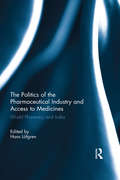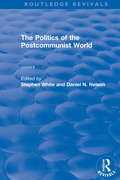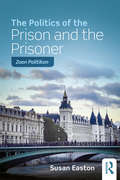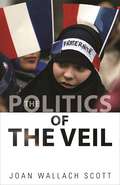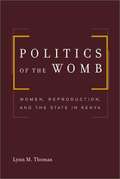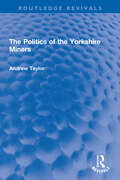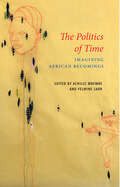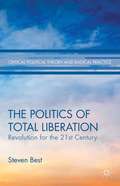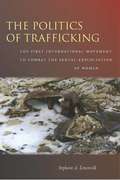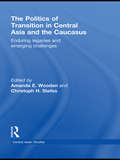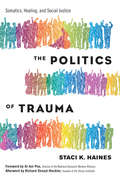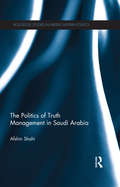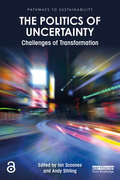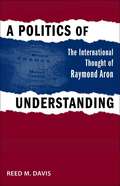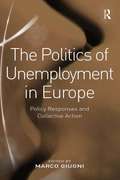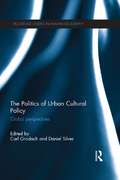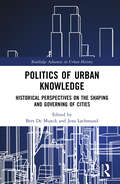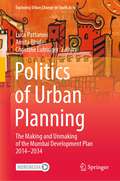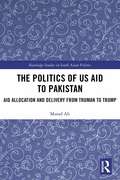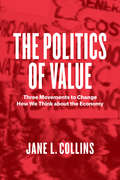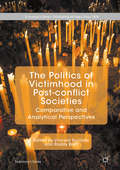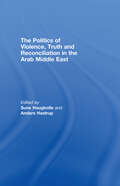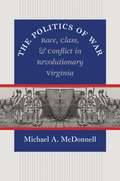- Table View
- List View
The Politics of the Pharmaceutical Industry and Access to Medicines: World Pharmacy and India
by Hans LöfgrenThe book studies the pharmaceutical industry of India. It is one of the most successful stories of economic expansion and improvements in public health. Indian firms have made access to quality medicines possible and affordable in many developing countries. Indian pharmaceuticals are also exported on a large scale to the United States and other highly regulated markets. A wave of mergers, acquisitions and tie-ups point to growing integration between Indian firms and global pharma multinationals.
The Politics of the Postcommunist World (Routledge Revivals)
by Stephen White Daniel N. NelsonThis title was first published in 2001. This series brings together the most significant journal articles to appear in the field of comparative politics since the 1970s. The aim is to render accessible to teachers, researchers and students, an extensive range of essays as a basis for understanding established terrain and new ground.
The Politics of the Prison and the Prisoner: Zoon Politikon
by Susan EastonIn recent years there has been a resurgence of interest in the role of the prison as a source of political ideas and site of political engagement, as well as in the prisoner’s quest for citizenship. The rising number of prisoners has increased fiscal burdens, which has meant that imprisonment has become a more important political issue. There is also greater interest in the prison as a site of political activism and in the generation of radical political ideas within the prison context and the formation of political networks within prison which extend beyond the prison walls. This book considers the prison as a site of political protest, discusses the quest for citizenship and the denial or negation of citizenship in prison, examines the discovery of politics in prison and the role of the prison in increasing political awareness, explores the treatment of political prisoners and reflects on the prisoner as a political problem for politicians negotiating pressures from the media and the public when addressing prisoners’ demands. Drawing on a range of contemporary and historical topics such as prison riots, radicalisation and the denial of voting rights, and including discussion of cases from the UK, US and Russia, this book examines the prison as a political institution and as a site of both politicisation and political protest. This book will be of interest to students and academics engaged with prisons, penology, punishment and corrections.
The Politics of the Veil (The Public Square #7)
by Joan Wallach ScottIn 2004, the French government instituted a ban on the wearing of "conspicuous signs" of religious affiliation in public schools. Though the ban applies to everyone, it is aimed at Muslim girls wearing headscarves. Proponents of the law insist it upholds France's values of secular liberalism and regard the headscarf as symbolic of Islam's resistance to modernity. The Politics of the Veil is an explosive refutation of this view, one that bears important implications for us all. Joan Wallach Scott, the renowned pioneer of gender studies, argues that the law is symptomatic of France's failure to integrate its former colonial subjects as full citizens. She examines the long history of racism behind the law as well as the ideological barriers thrown up against Muslim assimilation. She emphasizes the conflicting approaches to sexuality that lie at the heart of the debate--how French supporters of the ban view sexual openness as the standard for normalcy, emancipation, and individuality, and the sexual modesty implicit in the headscarf as proof that Muslims can never become fully French. Scott maintains that the law, far from reconciling religious and ethnic differences, only exacerbates them. She shows how the insistence on homogeneity is no longer feasible for France--or the West in general--and how it creates the very "clash of civilizations" said to be at the root of these tensions. The Politics of the Veil calls for a new vision of community where common ground is found amid our differences, and where the embracing of diversity--not its suppression--is recognized as the best path to social harmony.
Politics of the Womb: Women, Reproduction, and the State in Kenya
by Lynn M. ThomasIn more than a metaphorical sense, the womb has proven to be an important site of political struggle in and about Africa. By examining the political significance--and complex ramifications--of reproductive controversies in twentieth-century Kenya, this book explores why and how control of female initiation, abortion, childbirth, and premarital pregnancy have been crucial to the exercise of colonial and postcolonial power. This innovative book enriches the study of gender, reproduction, sexuality, and African history by revealing how reproductive controversies challenged long-standing social hierarchies and contributed to the construction of new ones that continue to influence the fraught politics of abortion, birth control, female genital cutting, and HIV/AIDS in Africa.
The Politics of the Yorkshire Miners (Routledge Revivals)
by Andrew TaylorFirst published in 1984, The Politics of the Yorkshire Miners examines all aspects of political activity of the Yorkshire Area of the NUM. The book was written using original research from the archives of the Yorkshire Area combined with the author’s personal experience. It explores developments from 1945 onwards, and looks at internal politics within the Area, discussing the nature of policies on both industrial bargaining and wider political aims. It considers the role of sponsored MPs and their relationship to the Area, as well as the NUM’s ‘special relationship’ with the Labour Party. The structure of the Area and its role within the NUM nationally are also discussed, and detailed analysis is given to the strikes of 1972 and 1974.
The Politics of Third Wave Feminisms
by Elizabeth EvansThe past twenty years have witnessed a renewal of interest in feminist activism on both sides of the Atlantic. In part this has been a response to neoliberal and neoconservative attacks, both implicit and explicit, on the gains made by feminists during the 1960s and 70s. This study adds a comparative dimension to the ongoing analysis of feminism and feminist activism by mapping, analysing and theorising third wave feminisms in the US and Britain. A key addition to Gender and Politics literature, it explores third wave feminisms by situating them within a specific political context, neoliberalism, and in relation to feminist theories of intersectionality, both of which present radical opportunities and practical challenges for feminism and the feminist movement.
The Politics of Time: Imagining African Becomings (Critical South)
by Achille Mbembe and Felwine SarrAs we enter the third decade of the twenty-first century, the world is undergoing a major historical shift: Africa, and the Global South more generally, is increasingly becoming a principal theatre in which the future of the planet plays itself out. But not only this: Africa is at the same time emerging as one of the great laboratories for novel forms of social, economic, political, intellectual, cultural, and artistic life. Often arising in unexpected places, these new forms of life materialize in practices that draw deeply from collective memory while simultaneously assuming distinctly contemporary, even futuristic, guises. In November 2017, the second session of the Ateliers de la pensée – Workshops of Thought – was held in Dakar, Senegal. Fifty African and diasporic intellectuals and artists participated and their debates unfolded along numerous thematic lines, approached from the standpoints of many different disciplines. This volume is the result of that encounter. Among the many topics discussed were the concurrence and entanglement of multiple temporalities, the politics of life in the Anthropocene, the project of decolonization, and the preservation and transmission of different ways of knowing. At a time when the world is haunted by the specter of its own end, the contributors to this volume ask whether one can, by taking Africa as a point of departure, seize hold of other options for the future – not only for Africa, but for the world. The Politics of Time and its companion volume, To Write the Africa World, will be indispensable works for anyone interested in Africa – its past, present, and future – and in the new forms of critical thought emerging from Africa and the Global South.
The Politics of Total Liberation
by Steven BestThis book argues that there is an ongoing planetary crisis, in both the social and natural worlds, that is of urgent importance. This demands a new politics, a politics of total liberation, one that grasps the need to unite the disparate movements for human, animal, and earth liberation. In the book, Best outlines a way forward despite challenges.
The Politics of Trafficking
by Stephanie LimoncelliSex trafficking is not a recent phenomenon. Over 100 years ago, the first international traffic in women for prostitution emerged, prompting a worldwide effort to combat it. The Politics of Trafficking provides a unique look at the history of that first anti-trafficking movement, illuminating the role gender, sexuality, and national interests play in international politics. Initially conceived as a global humanitarian effort to protect women from sexual exploitation, the movement's feminist-inspired vision failed to achieve its universal goal and gradually gave way to nationalist concerns over "undesirable" migrants and state control over women themselves. Addressing an issue that is still of great concern today, this book sheds light on the ability of international non-governmental organizations to challenge state power, the motivations for state involvement in humanitarian issues pertaining to women, and the importance of gender and sexuality to state officials engaged in nation building.
The Politics of Transition in Central Asia and the Caucasus: Enduring Legacies and Emerging Challenges (Central Asian Studies)
by Christoph H. Stefes Amanda E. WoodenMost books on the Caucasus and Central Asia are country-by-country studies. This book, on the other hand, fills a gap in Central Eurasian studies as one of the few comparative case study books on Central Eurasia, covering both the Caucasus and Central Asia; it considers key themes right across the two regions highlighting both political change and continuity. Comparative case study chapters, written by regional experts from a variety of methodological backgrounds, provide historical context, and evaluate Soviet political legacies and emerging policy outcomes. Key topics include: the varied types and sources of authoritarianism; political opposition and protest politics; predetermined outcomes of post-Soviet economic choices; social and stability impacts of natural resource wealth; variations in educational reform; international norm influence on gender policy and the power of human rights activists. Overall, the book provides a thorough, up-to-date overview of what is increasingly becoming a significant area of concern.
The Politics of Trauma: Somatics, Healing, and Social Justice
by Staci HainesAn essential tool for healers, therapists, activists, and survivors of trauma who are interested in a justice-centered approach to somatic transformationThe Politics of Trauma offers somatics with a social analysis. This book is for therapists and social activists who understand that trauma healing is not just for individuals--and that social change is not just for movement builders. Just as health practitioners need to consider the societal factors underlying trauma, so too must activists understand the physical and mental impacts of trauma on their own lives and the lives of the communities with whom they organize. Trauma healing and social change are, at their best, interdependent. Somatics has proven to be particularly effective in addressing trauma, but in practice it typically focuses solely on the individual, failing to integrate the social conditions that create trauma in the first place. Staci K. Haines, somatic innovator and cofounder of generative somatics, invites readers to look beyond individual experiences of body and mind to examine the social, political, and economic roots of trauma--including racism, environmental degradation, sexism, and poverty. Haines helps readers identify, understand, and address these sources of trauma to help us bridge individual healing with social transformation.
The Politics of Truth Management in Saudi Arabia (Routledge Studies in Middle Eastern Politics)
by Afshin ShahiExploring the management of ‘truth’ in the Kingdom of Saudi Arabia, this book aims to investigate the ways in which the official ‘truth’ is constructed and institutionalised in the country. The Politics of Truth Management in Saudi Arabia argues that there are two interrelated notions which articulate the ways in which ‘truth’ is conceptualised in Islam. One, at macro level, constitutes the trans-historical foundational principles of the religion, a set of engrained beliefs, which establish the ‘finality’, and ‘oneness’ of Islam in relation to other competing narratives. The other, at a micro level, takes place internally to find ‘truth’ within the ‘truth’. Unlike Islamic truth at the macro level, which is entrenched, the Islamic truth at the micro level refers to the various attempts by different agencies to claim to have found the ‘truth’ within the ‘truth’. Wahhabism, which is the product of an eighteenth century revivalist movement, is portrayed as the most ‘authentic’ reading of Islam. It is seen as the raison d'être for the prevailing political mechanism in the country and is introduced as an example of truth management at the micro level. Arguing that truth is not born in a power vacuum and often its construction and institutionalisation signify domination in one way or another, this book will be of interest to students of Religion, Politics, and Saudi Politics more specifically.
The Politics of Uncertainty: Challenges of Transformation (Pathways to Sustainability)
by Ian ScoonesWhy is uncertainty so important to politics today? To explore the underlying reasons, issues and challenges, this book’s chapters address finance and banking, insurance, technology regulation and critical infrastructures, as well as climate change, infectious disease responses, natural disasters, migration, crime and security and spirituality and religion. The book argues that uncertainties must be understood as complex constructions of knowledge, materiality, experience, embodiment and practice. Examining in particular how uncertainties are experienced in contexts of marginalisation and precarity, this book shows how sustainability and development are not just technical issues, but depend deeply on political values and choices. What burgeoning uncertainties require lies less in escalating efforts at control, but more in a new – more collective, mutualistic and convivial – politics of responsibility and care. If hopes of much-needed progressive transformation are to be realised, then currently blinkered understandings of uncertainty need to be met with renewed democratic struggle. Written in an accessible style and illustrated by multiple case studies from across the world, this book will appeal to a wide cross-disciplinary audience in fields ranging from economics to law to science studies to sociology to anthropology and geography, as well as professionals working in risk management, disaster risk reduction, emergencies and wider public policy fields.
A Politics of Understanding: The International Thought of Raymond Aron (Political Traditions in Foreign Policy Series)
by Reed M. DavisFrequently hailed as one of the greatest defenders of democratic liberalism in postwar Europe, French philosopher, sociologist, and political commentator Raymond Aron (1905--1983) left behind a staggering amount of published work on a remarkably wide range of topics both scholarly and popular. In A Politics of Understanding, Reed M. Davis assesses the originality and consistency of Aron's body of work, drawing a connection between Aron's philosophy of history and three of his abiding interests: the nature of industrial society, international relations theory, and strategic theory.Davis begins with a brief biography of Aron, known for his skepticism toward political ideologies in the post--World War II era and as an intellectual opponent of Jean-Paul Sartre. After spending three years in Germany in the early 1930s, Aron, a Jew, returned to France in 1933. When war broke out, he fought for a year in the French army and, after the fall of France, escaped to London, where he edited the newspaper of the Free French, La France Libre. He returned to Paris after the war and remained there for the rest of his life, working as a professor and journalist. He wrote an influential political column for Le Figaro for thirty years and authored many books, including The Opium of the Intellectuals (1935), The Algerian Tragedy (1957), and Peace and War (1962).From World War II onward, Davis shows, Aron sought to construct a science of human action that had as its goal charting the way of human progress in light of two fundamental realities, industrialization and the existence of nuclear weapons. Throughout his long career, he continually asked himself whether human life was becoming better as it became more technologically rationalized and more scientifically advanced. In his close analysis of Aron's thought, Davis carefully describes how Aron fused Max Weber's neo-Kantianism with Edmund Husserl's phenomenology to create an original theory of historical knowledge. The central theoretical impulse in all of Aron's works, Davis explains, is that of reconciling freedom and necessity. The ways in which Aron attempted to reconcile these two polarities in his earliest writings had a direct bearing on the manner in which he sought to reconcile realism and idealism in his international thought. By attempting to bring reason and necessity into the same loose orbit, Aron tried to construct a theoretical approach to international relations and statecraft that could hold the middle ground between realism and idealism. Many scholars have simply abandoned efforts to understand the more philosophical dimensions of Aron's thinking because of its technical difficulty. With A Politics of Understanding, Davis provides a concise and clearly written explanation of the basic concepts at work in Aron's philosophy and ties them directly to his later thinking, especially concerning international relations.
The Politics of Unemployment in Europe: Policy Responses and Collective Action
by Marco GiugniThis book offers a state-of-the-art discussion of the political issues surrounding unemployment in Europe. Its unique combination offers both a policy and institutional perspective, whilst studying the viewpoint of individual civil society members engaging in collective action on the issue of joblessness. It is the result of Marco Giugni’s three year cross-national comparative research project, financed by the European Commission, united with hand picked contributions from invited experts. Throughout his study he focuses on how the EU approaches national unemployment, the main national differences in talk about unemployment and unemployment policy, and how the representatives of the unemployed produce and coordinate demands in relation to unemployment policy. This book contains a number of genuinely cross-national chapters along with sections on specific national cases, namely the UK, Ireland, Germany, Switzerland, Belgium and Sweden.
The Politics of Urban Cultural Policy: Global Perspectives (Routledge Studies in Human Geography)
by Carl Grodach Daniel SilverThe Politics of Urban Cultural Policy brings together a range of international experts to critically analyze the ways that governmental actors and non-governmental entities attempt to influence the production and implementation of urban policies directed at the arts, culture, and creative activity. Presenting a global set of case studies that span five continents and 22 cities, the essays in this book advance our understanding of how the dynamic interplay between economic and political context, institutional arrangements, and social networks affect urban cultural policy-making and the ways that these policies impact urban development and influence urban governance. The volume comparatively studies urban cultural policy-making in a diverse set of contexts, analyzes the positive and negative outcomes of policy for different constituencies, and identifies the most effective policy directions, emerging political challenges, and most promising opportunities for building effective cultural policy coalitions. The volume provides a comprehensive and in-depth engagement with the political process of urban cultural policy and urban development studies around the world. It will be of interest to students and researchers interested in urban planning, urban studies and cultural studies.
Politics of Urban Knowledge: Historical Perspectives on the Shaping and Governing of Cities (Routledge Advances in Urban History)
by Bert De Munck Jens LachmundThis book uses 'politics of urban knowledge' as a lens to understand how professionals, administrations, scholars, and social movements have surveyed, evaluated and theorized the city, identified problems, and shaped and legitimized practical interventions in planning and administration. Urbanization has been accompanied, and partly shaped by, the formation of the city as a distinct domain of knowledge. This volume uses 'politics of urban knowledge' as a lens to develop a new perspective on urban history and urban planning history. Through case studies of mainly 19th and 20th century examples, the book demonstrates that urban knowledge is not simply a neutral means to represent cities as pre-existing entities, but rather the outcome of historically contingent processes and practices of urban actors addressing urban issues and the power relations in which they are embedded. It shows how urban knowledge-making has reshaped the categories, rationales, and techniques through which urban spaces were produced, governed and contested, and how the knowledge concerned became performative of newly emerging urban orders. The volume will be of interest to scholars and students in the field of urban history and urban studies, as well as the history of technology, science and knowledge and of science studies.
Politics of Urban Planning: The Making and Unmaking of the Mumbai Development Plan 2014–2034 (Exploring Urban Change in South Asia)
by Luca Pattaroni Amita Bhide Christine LutringerThis book offers an interdisciplinary and dynamic account of the politicization of urban planning in Mumbai, India. It presents a unique perspective on the tensions and conflicts pervading the development and regulation of contemporary cities in the wider context of global urbanization, and broadens readers’ understanding of urban planning, chiefly focusing on the interplay between grassroots movements, experts’ involvement, and sociotechnical questions. As the respective chapters of the book show, the various controversies surrounding the Mumbai Development Plan (MDP) have called into question the social and political effects of reshaping the city, the exclusion, and inequalities it has produced, but also the role it confers on the state and the market, and its impacts on the environment. After carefully describing these controversies, the book tackles the fundamental democratic question of who gets to define the future of a city. Given its scope, the book is of interest to researchers, students, and teachers of city planning, urban development, and urban studies, as well as policymakers.
The Politics of US Aid to Pakistan: Aid Allocation and Delivery from Truman to Trump (Routledge Studies in South Asian Politics)
by Murad AliThis book aims at uncovering the politics behind the provision of US foreign aid to Pakistan during three distinctive periods: the Cold War, the post-Cold War and the "war on terror". Focusing on a comprehensive analysis of aid allocation and delivery mechanisms, this book uncovers the primary factors behind historical as well as contemporary US aid to Pakistan so far not thoroughly and empirically studied, especially in the post-2001 period of the "war on terror". Furthermore, based on findings that have emerged from interviews with over 200 respondents, including government officials, representatives of donor aid agencies, the private sector, civil society organizations and primary beneficiaries of US-funded projects, this book offers significant insights to researchers, policy-makers and practitioners interested in the discipline of aid and development effectiveness. Making use of both quantitative and qualitative data and based on extensive fieldwork and primary data, this book fills a significant gap in the empirical analysis of US aid to Pakistan. As such, it will be of great interest to students and scholars of Asian and US politics, as well as to those who have teaching and research interests in disciplines such as international relations, history, strategic studies, international political economy and development studies.
The Politics of Value: Three Movements to Change How We Think about the Economy
by Jane L. CollinsThe Great Recession not only shook Americans’ economic faith but also prompted powerful critiques of economic institutions. This timely book explores three movements that gathered force after 2008: the rise of the benefit corporation, which requires social responsibility and eschews share price as the best metric for success; the emergence of a new group, Slow Money, that fosters peer-to-peer investing; and the 2011 Wisconsin protests against a bill restricting the union rights of state workers. Each case shows how the concrete actions of a group of citizens can prompt us to reflect on what is needed for a just and sustainable economic system. In one case, activists raised questions about the responsibilities of business, in the second about the significance of local economies, and in the third about the contributions of the public sector. Through these movements, Jane L. Collins maps a set of cultural conversations about the types of investments and activities that contribute to the health of the economy. Compelling and persuasive, The Politics of Value offers a new framework for viewing economic value, one grounded in thoughtful assessment of the social division of labor and the relationship of the state and the market to civil society.
The Politics of Victimhood in Post-conflict Societies: Comparative And Analytical Perspectives (St Antony's)
by Roddy Brett Vincent DruliolleThis volume sheds new light upon the role of victims in the aftermath of violence. Victims are central actors in transitional justice, the politics of memory and conflict resolution, yet the analysis of their mobilisation and political influence in these processes has been neglected. After introducing and explaining the reasons for this limited interest, the book’s chapters focus on a range of settings and draw on different disciplines to offer insights into the interrelated themes of victimhood – victims, their individual and collective identities, and their role in and impact upon post-conflict societies – and the politics of victimhood – meaning how victimhood is defined, negotiated and contested, both socially and politically. Because it outlines a stimulating research agenda and challenges the view that victims are passive or apolitical, this interdisciplinary volume is a significant contribution to the literature and will be of interest to scholars from disciplines such as law, anthropology, political science, human rights, international studies, and to practitioners.
The Politics of Violence, Truth and Reconciliation in the Arab Middle East
by Sune Haugbolle and Anders HastrupIn the last five to ten years, pressure for political liberalisation, and the growth of civil society and independent media, inside Arab countries have prompted the debate about violent events in the postcolonial period. This book features studies of six Arab countries in which legacies of political violence have been challenged through various initiatives to promote "truth-telling" and transitional justice. The analysis departs from a liberal, teleological understanding of truth and reconciliation as a linear process from trauma through memory to national healing. Instead, the articles highlight how the interplay between state-orchestrated initiatives (such as Truth and Reconciliation committees and ministerial committees); civil society actors (including former political prisoners, investigative journalists and NGOs); and external actors (such as transnational NGOs, state sponsored dialogue initiatives, the UN and the EU) is creating a new political field. The book examines the extent to which this field challenges the Arab nation-state’s monopoly on history and violence, and asks whether public narratives of violence, memory and justice consolidate or challenge political legitimacy of current regimes. This book was published as a special issue of Mediterranean Politics.
The Politics of Virtue: Is Abortion Debatable?
by Alan Freeman Elizabeth MenschFiercely committed to the separation of church and state, thoroughly pluralistic, largely secular: Where does a society like ours find common terms for conducting a moral debate? In view of the crises surrounding the issue of abortion, it is tempting to answer: nowhere. In this timely and provocative book, Elizabeth Mensch and Alan Freeman urge that we challenge the extremes of both the "pro-life" and "pro-choice" views of the abortion issue and affirm the moral integrity of compromise. Attempting to restore a level of complexity to the discussion and to enrich public debate so that we may move beyond our current impasse, the authors argue that it is essential to understand how issues of legal "rights" and theological concerns interact in American public debate.Returning to the years leading up to Roe v. Wade, Mensch and Freeman detail the role of religion and its relationship to the emerging politics of abortion. Discussing primarily the natural law tradition associated with Catholicism and the Protestant ethical tradition, the authors focus most sharply on the 1960s in which the present terms of the abortion debate were set. In a skillful analysis, they identify a variety of factors that directed and shaped the debate--including, among others, the haunting legacy of Nazism, the moral challenge of the civil rights movement, the "God is dead" discourse, school prayer and Bible reading, Harvey Cox's The Secular City, the Berrigans and Vietnam, the animal rights movement, and the movement of the church-going population away from mainstream Protestant tradition toward evangelical fundamentalism. By criticizing the rhetoric employed by both the "pro-choice" and "pro-life" camps, Mensch and Freeman reveal the extent to which forces on either side of the issue have failed to respond to relevant concerns. Since Roe v. Wade, the authors charge, public debate has seemed to concede the moral high ground to the "pro-life" position, while the "pro-choice" rhetoric has appeared to defend an individual's legal right to do moral wrong. Originally published as a special issue of The Georgia Law Review (Spring 1991), this revised and expanded edition will be welcomed by all those frustrated by the impasse of debates so central to our nation's moral life.
The Politics of War
by Michael A. McdonnellWar often unites a society behind a common cause, but the notion of diverse populations all rallying together to fight on the same side disguises the complex social forces that come into play in the midst of perceived unity. Michael A. McDonnell uses the Revolution in Virginia to examine the political and social struggles of a revolutionary society at war with itself as much as with Great Britain.McDonnell documents the numerous contests within Virginia over mobilizing for war--struggles between ordinary Virginians and patriot leaders, between the lower and middle classes, and between blacks and whites. From these conflicts emerged a republican polity rife with racial and class tensions. Looking at the Revolution in Virginia from the bottom up, The Politics of War demonstrates how contests over waging war in turn shaped society and the emerging new political settlement. With its insights into the mobilization of popular support, the exposure of social rifts, and the inversion of power relations, McDonnell's analysis is relevant to any society at war.
